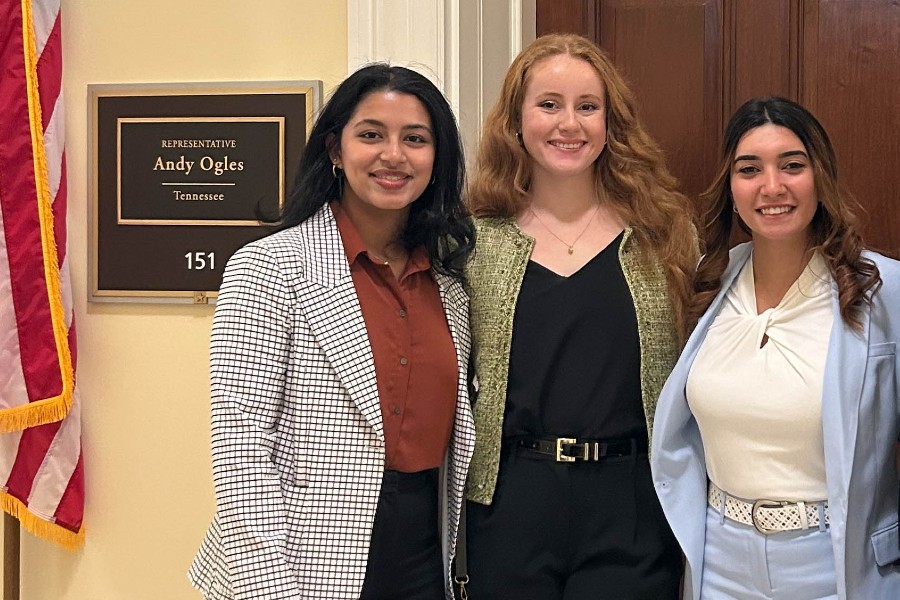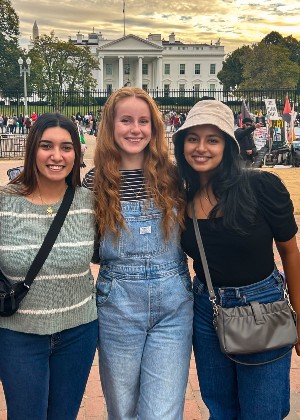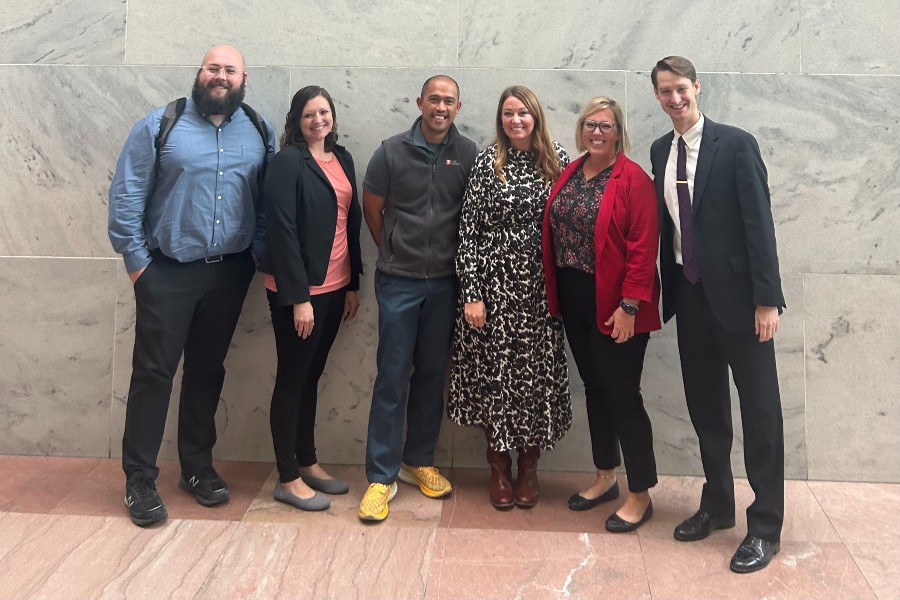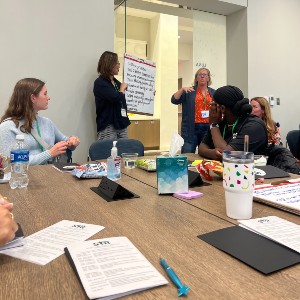Students, faculty advocate for undergraduate research at U.S. Capitol
Team of seven chosen for national program to learn how to tell the powerful story of research to the halls of power.
Janel Shoun-Smith |

Lipscomb students selected for the Council on Undergraduate Research Scholars Transforming Through Research (STR) program, posing outside U.S. Rep. Andy Ogles' Capitol office.
Becoming a great researcher involves collecting knowledge, developing rigorous skills and nurturing a creative spark, but a group of Lipscomb students and faculty learned this past year that it also involves telling the story of how research produces change and in a way that makes it meaningful for those in power positions.
For the first time since becoming a member of the Council on Undergraduate Research (CUR) in 2011, Lipscomb had two teams of students and faculty selected to participate in CUR’s Scholars Transforming Through Research (STR) Program.

Lipscomb's CUR STR Students in front of the White House during their trip to the nation's capitol.
STR is a six-month professional development program that trains the teams in research advocacy and hosts them in Washington, D.C. to advocate for undergraduate research to the U.S. Congress. In November, the seven members of Lipscomb’s two teams met with representatives for Sens. Marsha Blackburn (R-TN) and Bill Hagerty (R-TN), and Rep. Andy Ogles (R-5) to advocate for undergraduate research in the 2024 Federal Budget.
From October 2023 to April 2024, the teams learned to advocate to various stakeholders including members of Congress, funding agencies, donors and more. The STR training also covered how to do interviews and how to write and pitch articles on research topics, said Assistant Professor of Biology Josh Owens, the faculty mentor for one of the two teams.
While in Washington, D.C., before their congressional meetings, the Lipscomb teams went through six hours of professional development from the Scholars Strategy Network and the Bose Public Affairs Group.
“Sometimes in research, we get so siloed. A program like this allows us to break down the silos and learn how to educate the general public,” said Owens, who believes that empowering students to effectively share how their work is changing the world is very important for young researchers.
“It’s not always easy for faculty and students to communicate with the press, to prepare for interviews, to figure out the nuts and bolts of what to share that will be really helpful to the audience,” said Owens. “This program showed us how we can make our voices heard.”

Lipscomb Faculty Josh Owens (far right) and Amanda Williams (next to Owens) worked with other faculty team leaders chosen from across the nation for the STR program.
Due in part to the collective efforts of the STR participants from across the nation, the 2024 federal budget did not reduce any funds to federal research programs, said Owens, who is also Lipscomb’s undergraduate research coordinator.
Leah Jacob, a junior biochemistry and molecular biology major, said that as a student who grew up in India, it was interesting to see how citizens in the U.S. advocate for policies.
“I believe the program has helped me find ways of conveying stories that are important and identifying key problems. I believe this will help me in the future in both my career, especially in research and advocacy,” said Jacob.
Jacob, who has carried out research in the bacterial dynamics of surface attachment and the effects of energy drink consumption on gastric slow waves, also enjoyed the ongoing training during the school year, where team members were able to learn and discuss similar interests with students and faculty from other undergraduate universities. Around 65 people from all over the nation were selected for the STR program.
“It was interesting to note the different approaches other students took when it came to advocacy. Overall the experience was enlightening and full of important learning opportunities,” she said.

Students participated in advocacy training sessions led by Scholars Strategy Network and the Bose Public Affairs Group in Washington, D.C. before heading to Capitol Hill.
Maryam Gerges, a junior molecular biology major from Mount Juliet, Tennessee, has worked with the second STR team faculty mentor, Amanda Williams, assistant professor of biology, for a year on experiments relating to how the innate immune peptide, human alpha defensin 5 slows wound healing in Crohn’s colitis.
She also enjoyed meeting student researchers from all over the country and in various scientific fields. “I saw that research isn’t just important for biology but for other aspects as well,” she said. “Seeing students doing research in agriculture, working with animals, and other studies, I realized that research isn’t just a checkbox to check off, but it is the reason we have medical, technological and environmental advancements.”
“To meet people who can make change, allows students to feel seen and heard, and they realize they have power by being in a context where their narrative is heard and they can bring their testimony,” said Owens.
Lipscomb’s research leaders expect these students’ eye-opening experience and newfound skills to further grow undergraduate research.
“Our students are gaining essential skills that will help them to communicate effectively about their own research experiences and to advocate for undergraduate research and creativity on our campus,” said Florah Mhlanga, associate provost of undergraduate academic affairs.
Students are expected to serve as on-campus leaders to promote and advance undergraduate research at Lipscomb. Already, the benefits of this program are being seen as they are establishing a collaboration with Middle Tennessee State University’s Undergraduate Research Center, said Mhlanga.
CUR is a national organization that supports and promotes high-quality, mentored undergraduate research, scholarship and creative inquiry. Lipscomb draws on its resources to encourage and enhance undergraduate research on campus.